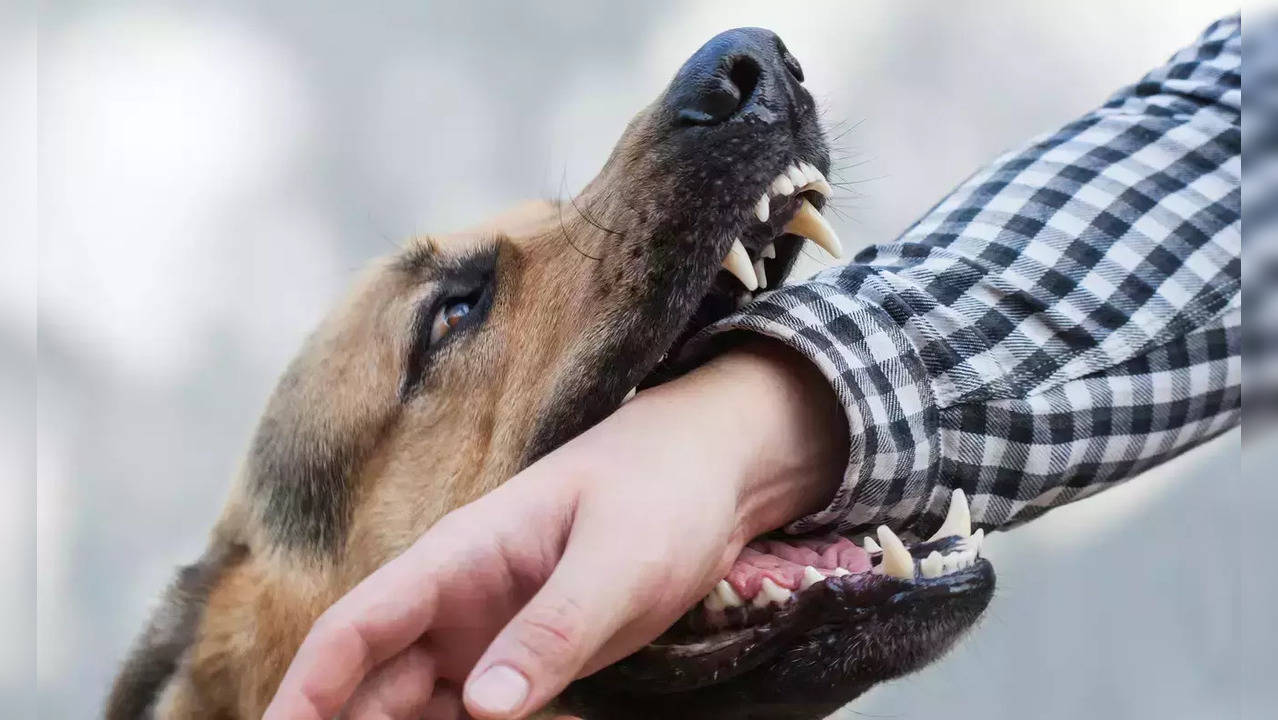Dog bite cases on the rise: Here's why kids hide canine attack info from parents; rabies can cause death
Whether a dog is friendly or ferocious, a dog bite is a completely different matter. Neglecting proper treatment can prove fatal, so here's what you must do if your child suffers an attack from a canine. These days, dog-bite cases are on the rise: Rabies kills due to ignorance, fear and lack of clear directions; this renowned doctor tells you what to do.

Dog bites should never be taken lightly. Every scratch and bite should be seen and clinically evaluated by a qualified medical professional, a doctor.
Most children adore dogs but many kids are also morbidly scared of their furry friends. The fear could be because the dog seemed unfriendly when responding to strangers or maybe the child has either experienced or has been warned of attacks by dogs.
Sometimes, parents warn kids to stay away from dogs, adding that the latter may cause a scratch, bite or injury that may necessitate the administering of 5 painful injections as anti-rabies vaccines (ARV). Does that help the child's interactions with dogs or does it only add to his or her fears?
What happens when a child suffers a dog bite? Some children keep the fact from parents for fear of reprisal or the fear of injection needles. Sadly, some cases culminate in rabies showing up and taking a young promising life in the most agonising way possible.
That makes one feel that while dogs are going to remain a valuable and almost ever-present component of human society, we can learn to save lives by educating people about rabies and what action one must take.
Times Now spoke to Dr Suresh Kumar Panuganti, Lead Consultant - Pediatric Critical Care and Pediatrics, Yashoda Hospitals - Hyderabad about the best way forward so that we can work towards eradicating rabies from our society.

Dr Suresh Kumar Panuganti - who as a paediatrician has a finger on the pulse of kids - said that having a pet is a dream of every child for many reasons. Some kids seek a canine companion as growing up in nuclear families with busy parents the inherent inquisitive nature of the child is happy to have a non-fussy partner and friend in the day's adventures. And when they get a pet, the excitement is mutual for the child as well as the pet and the experience is poor for both parties involved. They get to spend a lot of unsupervised time and the initial injuries are more -- including scratches and bites.
Times Now: Doctor, why are children so scared to report dog bites to parents and in some cases also fall victim to rabies?
Dr Suresh Kumar Panuganti: Children tend to underreport these bites because they are not aware of the seriousness of the bites and take them casually as harmless scratches. Children are psychologically stressed when separated from pets or restricted from outdoor play in the case of street dogs. Parents are also not aware of the seriousness and are not aware of new simple schedules of injections or vaccines. Education of the parents and also of the children at their respective schools and at pet shops should be made mandatory. The public display of posters about the importance of timely treatment of dog bites should be given importance.
Times Now: What should be the first aid after a dog bite?
Dr Suresh Kumar Panuganti: First of all, clean the wound with free-flowing water or soap and water immediately. Do not apply any local creams or turmeric powder. If the wound is bleeding, try to compress after cleaning to stop bleeding.
Times Now: When should one have the Anti-Rabies vaccine (ARVs) shots?
Dr Suresh Kumar Panuganti: As early as possible. Preferably on the same day but if it is unavoidable, can take the vaccine at the earliest.
Times Now: This is to clarify for the parents of little patients, especially in far-flung areas. Are anti-rabies vaccines given in the arm or IV and how are they spaced?
Dr Suresh Kumar Panuganti: Anti-rabies vaccines are given (intramuscular) in the muscle, not through an IV set. As far as where on the body you can take an ARV shot, it can be given on the upper arm or the anterior aspect of the thighs.
Times Now: Is there a cure for rabies or is untreated rabies always fatal?
Dr Suresh Kumar Panuganti: There is no definitive treatment for Rabies. It’s better to prevent the disease by taking vaccines appropriately.
Times Now: What about other vaccines or medicines that a dog bite victim must take, like Anti-tetanus etc?
Dr Suresh Kumar Panuganti: If the wound is unhealthy or associated with contamination and if the child patient has previously not received a TT (Tetanus Toxoid) injection, they should be given TT. Also if the wound is severe, the child requires immunoglobulin as well which will be infiltrated around the wound.
Times Now: Why should the wound be washed with soap and water? Should the wound be covered in bandages?
Dr Suresh Kumar Panuganti: The wound should be thoroughly washed to remove the saliva and virus as much as possible. No bandages are required if the wound is not profusely bleeding.
The Bottom Line:
Dr Panuganti also pointed out that parents need to step up vigilance as two age groups of children that are bitten most often are (1) under the age of 2 years and (2) aged 9-12. He added that the true incidence of dog bites is likely to be underestimated as studies have found that only 1/3rd of dog bite victims seek medical treatment and of those that do, not all will receive treatment in a hospital setting.
Disclaimer: Tips and suggestions mentioned in the article are for general information purposes only and should not be construed as professional medical advice. Always consult your doctor or a dietician before starting any fitness programme or making any changes to your diet.
Trending:
End of Article
Subscribe to our daily Lifestyle Newsletter!





Related News





8 Best Yoga Poses To Get Relief From Frozen Shoulder

WHO Says COVID-19 Worsened The ‘Silent’ Spread Of Antimicrobial Resistance

Does Walking After Meals Benefit Your Health?

Why Do People Faint In Extreme Temperatures? Know Ways To Protect Yourself

Leukaemia In Children: Early Signs Of The Disease That You Should Know









